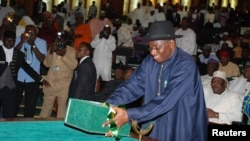ABUJA —
Nigeria's four main opposition movements announced a merger, posing the stearnest threat in years to President Goodluck Jonathan's ruling party ahead of elections in 2015.
Supporters said the new All Progressive Congress (APC) - made up of four regional parties - was the most significant effort to date to form a national opposition group in a country driven by geographic rivalries and an Islamist insurgency.
Past, smaller, attempts at opposition alliances have fallen apart amid infighting and analysts said, judging by past form, the new party might struggle to agree on a single presidential candidate for the vote.
"At no time in our national life has radical change become more urgent,'' said a statement signed on Wednesday by representatives of the four parties - the ACN, ANPP, APGA and CPC.
"[We are] determined to bring corruption and insecurity to an end, to grow our economy and create jobs in their millions and stop the increasing mood of despair and hopelessness among our people,'' they added.
President Jonathan's People's Democratic Party (PDP), which has won every presidential election since Africa's biggest oil producer returned to civilian rule 14 years ago, dismissed the new union.
"They are not a threat at all ... PDP is Messi in that contest,'' the party's national chairman Bamanga Tukur told reporters, likening his movement to the all-conquering Argentina and Barcelona soccer player Lionel Messi.
The PDP controls around two-thirds of the states and has a healthy majority in both houses of the national assembly.
The four merging parties control almost all the remaining seats and marginally reduced the PDP's majority in both the states and parliament in elections in 2011.
Infighting
Opposition attempts to form an alliance before that vote failed after the parties did not manage to agree on a single presidential candidate.
Analysts said the squabbling was typical of a system were politicians were often accused of putting personal and regional gains ahead of party loyalty and voters' interests.
"Policy and ideology do not feature prominently in a political discourse in Nigeria that is principally about winning or losing - and personal rivalries,'' said Nigeria analyst Antony Goldman, head of Africa-focused PM Consulting.
"The challenge will be translate such common purpose from principle to practice,'' Goldman added.
Tightly fought elections in Africa's second biggest economy can often stoke violence. Hundreds were killed in riots in the mostly Muslim north when Christian southerner Jonathan won the presidential vote two years ago.
Jonathan has not said whether he will run again.
The APC merger was brokered this week by 10 opposition state governors, many of whom will end their terms in 2015 and are looking for new roles.
It was not clear whether the merger wqas backed by all the four parties' state governors and lawmakers.
Official changes of party will have to be agreed with the Independent National Electoral Commission (INEC). The INEC spokesman did not respond to calls for comment.
Supporters said the new All Progressive Congress (APC) - made up of four regional parties - was the most significant effort to date to form a national opposition group in a country driven by geographic rivalries and an Islamist insurgency.
Past, smaller, attempts at opposition alliances have fallen apart amid infighting and analysts said, judging by past form, the new party might struggle to agree on a single presidential candidate for the vote.
"At no time in our national life has radical change become more urgent,'' said a statement signed on Wednesday by representatives of the four parties - the ACN, ANPP, APGA and CPC.
"[We are] determined to bring corruption and insecurity to an end, to grow our economy and create jobs in their millions and stop the increasing mood of despair and hopelessness among our people,'' they added.
President Jonathan's People's Democratic Party (PDP), which has won every presidential election since Africa's biggest oil producer returned to civilian rule 14 years ago, dismissed the new union.
"They are not a threat at all ... PDP is Messi in that contest,'' the party's national chairman Bamanga Tukur told reporters, likening his movement to the all-conquering Argentina and Barcelona soccer player Lionel Messi.
The PDP controls around two-thirds of the states and has a healthy majority in both houses of the national assembly.
The four merging parties control almost all the remaining seats and marginally reduced the PDP's majority in both the states and parliament in elections in 2011.
Infighting
Opposition attempts to form an alliance before that vote failed after the parties did not manage to agree on a single presidential candidate.
Analysts said the squabbling was typical of a system were politicians were often accused of putting personal and regional gains ahead of party loyalty and voters' interests.
"Policy and ideology do not feature prominently in a political discourse in Nigeria that is principally about winning or losing - and personal rivalries,'' said Nigeria analyst Antony Goldman, head of Africa-focused PM Consulting.
"The challenge will be translate such common purpose from principle to practice,'' Goldman added.
Tightly fought elections in Africa's second biggest economy can often stoke violence. Hundreds were killed in riots in the mostly Muslim north when Christian southerner Jonathan won the presidential vote two years ago.
Jonathan has not said whether he will run again.
The APC merger was brokered this week by 10 opposition state governors, many of whom will end their terms in 2015 and are looking for new roles.
It was not clear whether the merger wqas backed by all the four parties' state governors and lawmakers.
Official changes of party will have to be agreed with the Independent National Electoral Commission (INEC). The INEC spokesman did not respond to calls for comment.





